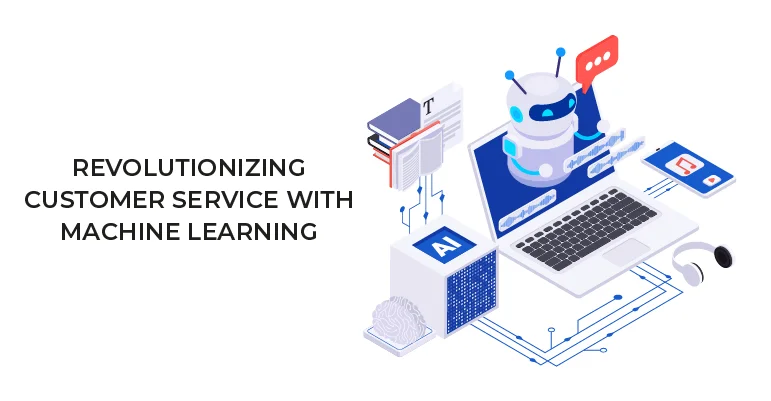Introduction
Customer service has always been a cornerstone of successful businesses. It’s the frontline of interaction between a company and its customers, and as technology evolves, so too must customer service. Machine learning, a subset of artificial intelligence (AI), has emerged as a game-changer in this arena. In this blog, we will explore the incredible potential of machine learning-powered customer service and how it is transforming the way businesses interact with their clients.
Understanding Machine Learning
Machine learning is a subset of AI that focuses on the development of algorithms and statistical models that enable computer systems to improve their performance on a specific task through learning from data. It involves the use of vast amounts of data to train algorithms, allowing them to make predictions, decisions, and recommendations without being explicitly programmed.
Machine Learning in Customer Service Chatbots and Virtual Assistants:
One of the most noticeable applications of machine learning in customer service is chatbots and virtual assistants. These intelligent bots can engage with customers in real time, answer frequently asked questions, and provide assistance 24/7. They use natural language processing (NLP) to understand and respond to customer queries accurately.
Personalized Recommendations:
Machine learning algorithms analyze customer data, including purchase history, browsing behavior, and preferences, to provide personalized product recommendations. This not only enhances the customer experience but also boosts sales and customer loyalty.
Sentiment Analysis:
Machine learning can analyze customer reviews, social media comments, and feedback to gauge customer sentiment. By understanding how customers feel about a product or service, companies can make informed decisions and take prompt actions to address concerns or capitalize on positive feedback.
Predictive Analytics:
Machine learning models can predict customer behavior, such as churn risk or potential upsell opportunities. This allows companies to proactively retain customers and optimize their marketing strategies.
Automated Ticket Routing:
Large organizations often receive a high volume of customer support requests. Machine learning can automatically route these tickets to the most appropriate customer service agent based on the nature of the issue and the agent’s expertise, reducing response times and improving efficiency.
Benefits of Machine Learning-Powered Customer Service 24/7 Availability:
Chatbots and virtual assistants powered by machine learning are available round the clock, ensuring that customers can get assistance whenever they need it, even outside of regular business hours.
Cost Efficiency:
Automation through machine learning can significantly reduce operational costs by handling routine queries and tasks, allowing human agents to focus on more complex and high-value interactions.
Improved Customer Experience:
Personalized recommendations and proactive support based on predictive analytics lead to a better customer experience, fostering customer loyalty and retention.
Data-Driven Insights:
Machine learning generates valuable insights from customer data, enabling companies to make data-driven decisions and continuously improve their products and services.
Challenges and Considerations:
While machine learning-powered customer service offers immense potential, there are challenges to consider:
Data Privacy:
Handling customer data requires strict adherence to data privacy regulations. Companies must ensure that their machine learning systems comply with laws like GDPR and prioritize data security.
Training and Maintenance:
Machine learning models require constant training and updates to remain accurate and relevant. This demands ongoing investment in terms of time and resources.
Human-AI Collaboration:
Striking the right balance between automated services and human interaction can be tricky. Companies must determine when and how to hand off complex issues from bots to human agents seamlessly.
Shopware 6: A Supportive E-commerce Platform
Shopware 6 is a popular e-commerce platform known for its flexibility and extensibility. It can be a strong support system for implementing machine learning-powered customer service for several reasons:
Open API Architecture:
Shopware 6’s open API architecture makes it easier to integrate with external machine-learning services and tools. This flexibility allows you to choose the best machine-learning solutions for your specific needs.
Extensive Plugin Marketplace:
Shopware 6 boasts a vast marketplace of plugins and extensions. Many of these can be leveraged to integrate machine learning capabilities seamlessly, whether for chatbots, personalization, or analytics.
Scalability:
As your e-commerce business grows, Shopware 6 can scale with you. Machine learning solutions often require more resources as data volumes increase, and Shopware 6 can accommodate this growth.
Steps to Integrate Machine Learning-Powered Customer Service with Shopware 6
Integrating machine learning-powered customer service with Shopware 6 involves several steps:
Identify Your Needs:
Determine which aspects of customer service can benefit most from machine learning, such as chatbots, personalized recommendations, or predictive analytics.
Select Machine Learning Tools:
Research and choose the machine learning tools or services that align with your objectives. Consider factors like pricing, compatibility, and performance.
Data Preparation:
Gather and prepare your e-commerce data. Clean, structured data is essential for training machine learning models effectively.
Integration:
Utilize Shopware 6’s open API and available plugins to integrate the selected machine-learning tools into your e-commerce store.
Training:
Train your machine learning models using historical data to ensure they provide accurate and valuable insights or services.
Testing and Optimization:
Test the integrated solutions thoroughly and continually optimize them for better performance and accuracy.
Monitoring and Maintenance:
Regularly monitor the machine learning systems, and update models as necessary. Stay informed about changes in the e-commerce landscape and emerging machine learning trends.
Conclusion
Machine learning-powered customer service is a game-changer for e-commerce businesses, offering improved efficiency and a more personalized shopping experience. Shopware 6, with its open architecture and extensive plugin ecosystem, provides a supportive platform for integrating machine learning seamlessly into your e-commerce store. By following the steps outlined above and staying committed to ongoing monitoring and optimization, you can leverage the power of machine learning to enhance your e-commerce customer service and stay ahead in the competitive e-commerce market.








